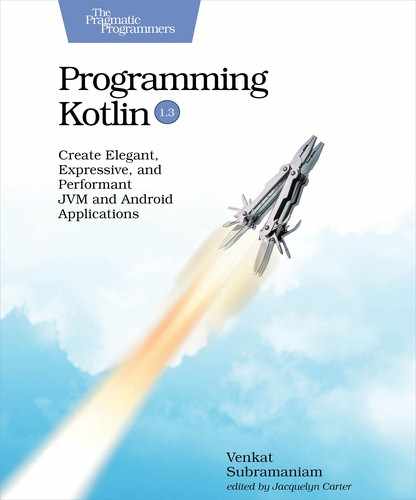Appendix
2
Kotlin/Native
In addition to JVM, JavaScript, Android devices, iOS, and Raspberry Pi, you can target your Kotlin code to native platforms like Windows, Mac OS, and Linux. The Kotlin compiler’s front end compiles your Kotlin code to an intermediate representation. Kotlin/Native is an LLVM-based back end of the compiler that targets the intermediate representation to self-contained programs that can run natively without a virtual machine. Your Kotlin code can interoperate with native libraries—for example, code written using the C language, Objective-C, and Swift. You can use this option to create fast running native applications and to interoperate with native libraries.
In this appendix, we’ll take a look at a small example that illustrates compiling Kotlin code to target MacOS. To target the example to other operating systems, refer to the toolchain requirements on the Kotlin/Native[45] website.
To compile Kotlin code to native platform, you need the Kotlin/Native compiler. Download it from the binary distribution[46] website. Once you install it, add the bin directory that contains the tools like cinterop and kotlinc-native to the path.
To get a glimpse of the power of Kotlin/Native, let’s create a small function in C and then call it from within Kotlin code. As a first step, let’s create a C header file named fib.h under a c directory.
| | int fib(int n); |
The header file declares a function named fib() that takes an integer value and returns an integer value.
Next, let’s implement this function in a file named fib.c, also placed in the c directory:
| | #include "fib.h" |
| | |
| | int fib(int n) { |
| | return n < 2 ? 1 : fib(n - 1) + fib(n - 2); |
| | } |
The function computes, using recursion, the Fibonacci number for the given parameter. We’ll need a C compiler to compile this code and create a library. You may use any C compiler that you’re familiar with. Here, we’ll use the GCC[47] GNU compiler and then the ar archival tool to bundle the object file created by the compiler into a library archive file.
| | $ gcc -c c/fib.c |
| | $ ar crv libfib.a fib.o |
The gcc command as shown above will compile the C code that is in the file fib.c into an object file named fib.o. Then the ar command will bundle that file into an archive file named libfib.a.
Next, we’ll use this library from within Kotlin code. To invoke the int fib(int); C function from within Kotlin, we need a Kotlin representation fun fib(n: Int): Int. Creating this manually can be tedious and error prone when working with any nontrivial libraries. The cinterop tool, which is part of the Kotlin/Native distribution, removes that burden by autogenerating the function signature from the C header files.
To assist the cinterop tool, we need to create an interop def that provides the necessary information, like the name and location of the header files, library file to link with, and so on. You may also include declarations and implementations of C functions directly in the def file after a triple dash separator line (—). That’s a way to try interop without the need to have a C compiler.
Let’s create the def file, also under the c directory:
| | headers = fib.h |
| | linkerOpts.osx = -L. -lfib |
The headers property lists the header files for the cinterop tool to process. The linkerOpts property lists the location and the name of the archive file—the -l option mentions the archive file name without the lib prefix and the .a suffix.
Let’s run the cinterop tool to generate the Kotlin signature for the C function:
| | $ cinterop -def c/interop.def -compilerOpts -I./c -o libfib |
This command instructs the cinterop tool to process the interop.def file. The -I option provides the location of the header file mentioned within the def file. The -o option specifies the name of the Kotlin linking file to generate.
After running the command, examine the files generated. The Kotlin signature file for the function resides in the generated file libfib-build/kotlin/interop/interop.kt. We’ll import this file from within our Kotlin code to call the fib() C function.
Here’s the sample Kotlin code to call the fib() function, written in a file named sample.kt under a new kotlin directory.
| | import interop.* |
| | |
| | fun main() { |
| | println("fib(10) is ${fib(10)}") |
| | } |
We’ll use the kotlinc-native compiler to compile this Kotlin source code to a native target.
| | $ kotlinc-native kotlin/sample.kt -library libfib -o sample |
The previous command generates a native executable file named sample.kexe. Run the executable to watch Kotlin code call the C function:
| | $ ./sample.kexe |
| | fib(10) is 89 |
This example illustrates both the Kotlin-C interop and how Kotlin code can be targeted to a native platform and can be run as a native executable.
